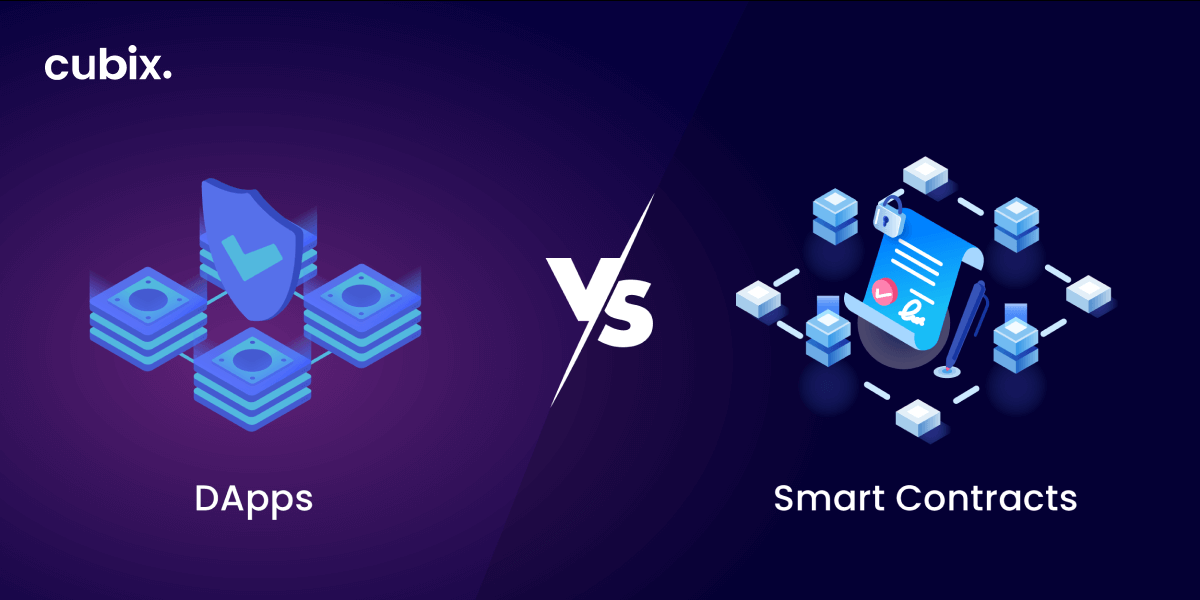Blockchain technology is the best solution to transform your businesses digitally. It has had a powerful impact on the technological world since its inception. Leveraging blockchain as a core concept, smart contracts and decentralized applications offer real-time solutions to various industrial sectors.
This blog will highlight two of the blockchain's staple digital products: Dapps and smart contracts, discussing their merits, similarities, and differences.
What are Dapps?
Dapp is a completely open-source application. It operates without the interference of any external entity. The data and the records are stored automatically in a decentralized, public blockchain.
Since they are decentralized, they are free from any interference from the central authority. The tokens are generated according to a predefined algorithm or a set of measures. The application primarily uses these generated tokens and rewards users by paying them in digital tokens.
What are Smart Contracts
A smart contract is a set of requirements and clauses in digital form. First, it records all the data and transactions that have occurred through the blockchain technology operating at the base. Then, it executes the code on the blockchain to settle an agreement between the two parties.
In the comparison between Dapps vs. smart contracts, smart contracts are declared a critical component for most platforms built on distributed ledger and blockchain technology. Therefore, it focuses on performing primary tasks, such as moving a certain amount of cryptocurrency from one party's wallet to another.
Nick Szabo, the famous American computer scientist and the inventor of the virtual currency "bit gold," defined smart contracts as a set of digital transaction protocols that runs the terms of the contract. Smart contract transactions are transparent and trackable.
See More: Learn About Our Exceptional DApp Development Services
Benefits of Dapps
Regular System Upgrades
As the battle between smart contracts and Dapps technologies is still in its initial stage, they will inevitably evolve. Therefore, dapps are constantly employing system upgrading methods to improve overall efficiency.
Low Latency
Dapps cuts down the user's response time and makes themselves highly competitive in the blockchain market. Its future goal is to achieve significantly lower latency to support faster interactions with applications.
P2P Network
Based on the P2P network architecture, there is a minimum chance of a single failure or error. That means you are good to go with no restrictions and no downtime.
Benefits of Smart Contracts
Transparent Communication
The guidelines set in the contract cannot be amended; therefore, the contract is error-free and fraudless.
Fast and Systematic
The main difference between Dapp and smart contracts is that smart contracts are primarily dependent on the other nodes present in the network, due to which they don't require human involvement. Therefore, once the smart contract tampers, it automatically executes itself.
Unlike the traditional systems used earlier, which required some human verification, in smart contracts, the interlinked nodes verify the amount paid and whether the correct services are delivered.
Data Security
The smart contracts' data is end-to-end encrypted, making it impossible to hack. The previous blocks in the chain keep track of the next data entry. Thus, to change a single data record, the entire chain needs to be hacked at once, which is a tough task.
Read More: The Complete Dapp Development Process Explained
Dapps VS Smart Contracts: Key Differences
Dapps | Smart Contracts | |
Characteristic | Dapps are blockchain-powered websites. | Smart contracts are API connectors, connecting blockchain with Dapps. |
Coding | Decentralized Applications run their backend code on the dapp itself. | Smart contracts execute code by connecting a dapp to a member with a supplier. |
Communication | Dapp communication involves smart contracts and the blockchain itself. | Smart contracts communicate by allowing dapps to connect users with blockchain technology. |
Dapps VS Smart Contracts: Similarities
Smart contracts are the co-partners of Dapps in terms of operations. They both are automated and run on a decentralized network, not controlled by a central authority. These two separate systems were once regarded as one due to their shared use of the Ethereum blockchain.
Dapps and Smart contracts are interconnected with each other. Smart contracts act as an interface between blockchain and Dapps, evaluating and analyzing the operation of the Dapps. In addition, smart contracts function as an Application Programming Interface (API), connecting the blockchain webwork with Dapps.
Dapps vs. Smart Contracts: Which one is for you?
Comparing Dapps vs. smart contracts, they are still finding their feet and are not perfect but evolving daily. Smart contracts are the best choice for day-to-day transactions, as employing them makes the process error-free and pocket friendly.
Their competitor, Dapps, can be used to carry out a particular task. They are used for major financial, logistics, and gaming purposes. Their source code is made public, so anyone can modify it according to their needs without being controlled by a superior authority.
Now you must be wondering which of these two technologies you should invest your time and effort in. Again, it's easy: choose the one that best fits your demand.
Read More: Best Practices for Developing Secure Ethereum Smart Contracts
Ready to Build Your Next Digital Product?
Automate your business-related agreements with Dapps and smart contracts that will provide you with the highest levels of authenticity and reliability. Cubix provides highly secure Dapps and smart contracts auditing services embedding the latest technologies. Robust development of smart contracts to achieve your goals faster.
Get equipped with the top smart contract development company's tech experts. Digitize your business transactions with transparent workflows, as the conditions are implemented to provide verified accessibility with visible information around the blockchain networks.
Feel free to contact us.

